What Is A Cryptocurrency Wallet: Types, Features and How It Works
Table of Contents
Since the inception of Bitcoin, the number of cryptocurrencies has been increasing every passing day. Traders and investors possess multiple currencies, and it is hard to handle them and trade. That’s why crypto wallets are the talk of the town. In this detailed blog, we will understand all we should know about crypto wallets.
What are Crypto Wallets?
A crypto wallet is a kind of digital vault where people store public and private keys needed to perform transactions of cryptocurrencies. These wallets are safe, easy to use, and have multi-platform support. Against the common notion that a wallet means something that stores currency, crypto wallets store keys to the coins that the user holds. If the user wants to perform a transaction, it needs to verify its wallet address via a private key.
What are Public and Private Keys?
Public Keys
The public keys are like account numbers we have in the traditional banking system. The user needs to share this key with the other users on the platform to receive any cryptocurrency. These public keys are combined with a corresponding private key.
Private Keys
The public keys of the users are organized by a private key. That private key holds ownership of the public key. To receive or sell a cryptocurrency, the role of these private keys is cardinal.
The Significance of Crypto Wallets
The safety of cryptocurrencies is a big concern for the users. Cryptocurrencies are prone to cyber-attacks, phishing and scams. Also, storing digital assets in large amounts on crypto exchanges can be risky and may get stolen in case of a data security breach in the exchange. That’s why it has been advised to the users to withdraw their cryptocurrencies from the exchange platforms and store them with the help of crypto wallets. Several types of crypto wallets help users retain ownership of their digital assets and provide them with a secure way of storing them.
Working Methodology of Crypto Wallets
Crypto wallets work as a platform that empowers you to sell, buy or exchange cryptocurrencies. These wallets also interact with blockchain networks to perform transactions. Crypto wallets are facilitated by crypto addresses, which secure the transaction and provide transparency.
Crypto wallets have unique crypto addresses, which the traders use to receive cryptocurrencies. Users transform these addresses as QR codes and display them to the people making the payments. These wallets have a string of alphabets and numerals combined to form a unique wallet address. Every cryptocurrency network has a specific wallet format and length, which makes it easy for the payer to send money to the correct wallet address and to mitigate any loss of funds.
The major working of crypto wallets revolves around public and private keys, and we have already gone through the working of public and private keys in the previous section. With the help of these keys, users can perform transactions of cryptocurrencies without putting the integrity of the cryptocurrency or the transaction itself at risk.
Types of Cryptocurrency Wallets
Cryptocurrency wallets are of two types depending on their features and use: hot wallets and cold wallets.
Hot Wallets
Hot Wallets are digital wallets that are in the form of computer software. These wallets cannot be accessed without the Internet. Users can use these wallets from any mobile device or a desktop. These wallets are also accessible through browsers and web extensions. These wallets make the transactions hassle-free. These are of perfect use for institutional traders or users who trade more often than others. However, these wallets are more prone to cyber-attacks and Phishing, as compared to cold wallets, because these are easily accessible via the Internet. There are different types of hot wallets, such as web-based wallets and mobile wallets.
Web-based Wallets
Among the hot wallets, web-based wallets have grown immensely popular among users because these wallets are easily accessible through web browsers and browser-based applications. These wallets are highly convenient and can be easily accessed from anywhere. Users can make immediate payments smoothly without wasting time.
These wallets face high risks from hackers and do not allow multi-currency support. Web-based wallets have not yet been updated to support cryptocurrencies other than Bitcoin and Ethereum.
Mobile Wallets
These wallets are easily accessible to users and can be operated through mobile devices from anywhere in the world. Mobile wallets are perfect for users who make frequent crypto transactions. They store the users’ private and public keys and enable quick accessibility.
Cold Wallets
Like hot wallets, cold wallets cannot be operated through the Internet. This means they are less vulnerable to phishing, cyber-attacks and scams. They can be in the form of a paper or hardware device like a Pen drive or a USB. These wallets are not as convenient as compared to the hot wallets. Cold wallets can be classified into paper wallets and hardware wallets.
Paper Wallets
In this type of wallet, private and public keys are printed on paper or written down manually. It is less vulnerable as compared to hot wallets because these are not prone to cyber-attacks and thefts. However, it takes a lot of effort to keep paper wallets safe because they can be lost or destroyed easily.
Hardware Wallets
These wallets are in the form of external devices such as USB or Bluetooth devices. These wallets are the most secure form of crypto wallets to store a large amount of cryptocurrency safely.

Features of a Crypto Wallet
Multiple features make a crypto wallet safe and convenient for the users, some of these features are:
Intuitive User Interface
A wallet can be as good as its interface. An intuitive interface helps users seamlessly navigate the functions of the wallet. The user interface should be designed for both beginners and seasoned investors. A good user interface provides a smooth experience for the investors and saves them from hassle.
Two-factor Authentication
Cryptocurrencies are always at risk of getting stolen by cyber frauds because they are still new to the market, and there are not so many rules and regulations to protect them. Two-factor authentication makes the crypto wallet more secure. In two-factor authentication, a wallet can be accessed only by entering a password and a one-time code.
Multi-currency Support
One of the most significant features of a crypto wallet is multi-currency support. People like to invest in multiple currencies to generate more revenues. That’s why crypto wallets need to be designed to support multiple currencies so that users can make transactions with different assets under the same wallet.
DApp Support
This feature of crypto wallets allows users to send or receive cryptocurrencies from decentralized exchanges. Crypto wallets are provided with DApp support to promote interoperability.
Multi-signature Support
To save the wallet from hacking and phishing, a multi-signature support feature is mandatory in crypto wallets. In the wallets with multi-signature support, users have multiple private keys to execute a transaction. That makes crypto wallets less vulnerable.
Anti-phishing Software
Anti-phishing software is integrated into crypto wallets to save them from phishing and hacking. This software detects any unusual activity in the wallet and prevents it.
Custodial and Non-custodial Wallets
Crypto wallets are further classified into custodial and non-custodial wallets based on the ownership of the private keys
Custodial Wallets
Custodial wallets are a kind of institutional wallets, and they are offered by the crypto exchange platforms. The exchanges hold the private keys of the users required to make a transaction. These wallets are empowered with features like two-factor authentication, multi-signature support and facial recognition to keep the private keys secure and build trust among the users
Non-custodial Wallets
Non-custodial wallets empower users to hold the ownership and private keys to themselves. However, as a backup mechanism, it asks users to write down a recovery phrase that consists of 12 randomly generated words. If the users lose the private keys, they can regain them. Hardware wallets are a type of non-custodial wallets.
Custodial and non-custodial wallets have their pros and cons, subjective to the needs of the users. People who want complete ownership of their private keys and do not trust the crypto exchange platforms rely on non-custodial wallets. But for the beginners, custodial wallets are perfect.
Non-Fungible Tokens (NFT) Wallets
Like NFTs, NFT wallets are immensely popular among crypto dwellers, especially among artists, gamers and music composers. The section of people who benefitted highly from the NFTs faced issues with storing their NFTs. NFT wallets have provided these people with a perfect platform to store their NFTs. These wallets are compatible with the NFT marketplaces and provide enhanced security via two-factor authentication and biometric recognition. NFT wallets that have the feature of cross-platform compatibility are the most popular ones. Delta6Labs develops NFT wallets with all such features, providing security and seamless navigation within the wallets.
The Future of Crypto Wallets
Crypto wallets are immensely popular among the users of the crypto community. With features like multi-signature support, multi-currency support, interoperability and an Intuitive user interface, crypto wallets provide a secure platform for users to store their public and private keys.
The global market value of crypto wallets was USD 11 billion in the year 2024, and it is poised to grow to USD 78 billion by the year 2032. The region-wise data suggests that the USA is the highest contributor to the global market size of crypto wallets, followed by Canada and the European nations. Among the European nations, Germany is one of the most promising and fastest-growing nations as a contributor to the crypto wallet market.
Market insights and data suggest that the future of crypto wallets is bright, the market size will grow at a CAGR of 25%, and the prospects lying ahead are promising.
Conclusion
The crypto community is pressing hard towards growth and improvements. Crypto wallets are also among the constraints of the crypto world that are growing and improving rapidly. Crypto Wallets are gaining popularity among users because they provide secure vaults to store public keys and private keys required to make transactions.
Along with many features of crypto wallets, they have some challenges as well. One of the most critical challenges that crypto wallets face is security vulnerabilities. These wallets are highly vulnerable to phishing attacks. Lack of regulatory compliance is also a big issue in crypto wallets, due to which users do not trust crypto exchange platforms to store their keys.
Since crypto wallet development is a new process in the software solution market, it is facing various troubles, but it is improving every day, and certainly, it will overcome all these challenges shortly and move towards a vibrant future.
Frequently Asked Questions
Disclaimer:
The information on this blog is for knowledge purposes only. The content provided is subject to updates, completion, verification, and amendments, which may result in significant changes.
Nothing in this blog is intended to serve as legal, tax, securities, or investment advice of any investment or a solicitation for any product or service.






